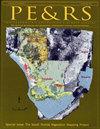基于互补信息学习模型的多视角城市场景分类
IF 2
4区 地球科学
Q4 GEOGRAPHY, PHYSICAL
引用次数: 4
摘要
传统的城市场景分类方法主要集中在卫星或鸟瞰图上。虽然在大多数情况下,单视图图像能够获得令人满意的场景分类结果,但需要其他图像视图提供的补充信息来进一步提高性能。因此,我们提出了一种互补信息学习模型(CILM)来对航空和地面图像进行多视图场景分类。具体而言,本文提出的CILM以空中和地面图像对为输入,学习特定于视图的特征,然后进行融合,以整合互补信息。为了训练CILM,利用由交叉熵和对比损失组成的统一损失来增强网络的鲁棒性。训练完CILM后,通过提出的两种特征提取场景提取每个视图的特征,然后融合训练支持向量机分类器进行分类。在两个公开的基准数据集上的实验结果表明,CILM模型取得了显著的性能,表明它是一种学习互补信息从而改进城市场景分类的有效模型。本文章由计算机程序翻译,如有差异,请以英文原文为准。
Multi-View Urban Scene Classification with a Complementary-Information Learning Model
Traditional urban scene-classification approaches focus on images taken either by satellite or in aerial view. Although single-view images are able to achieve satisfactory results for scene classification in most situations, the complementary information provided by other image views
is needed to further improve performance. Therefore, we present a complementary information-learning model (CILM) to perform multi-view scene classification of aerial and ground-level images. Specifically, the proposed CILM takes aerial and ground-level image pairs as input to
learn view-specific features for later fusion to integrate the complementary information. To train CILM, a unified loss consisting of cross entropy and contrastive losses is exploited to force the network to be more robust. Once CILM is trained, the features of each view are
extracted via the two proposed feature-extraction scenarios and then fused to train the support vector machine classifier for classification. The experimental results on two publicly available benchmark data sets demonstrate that CILM achieves remarkable performance, indicating that
it is an effective model for learning complementary information and thus improving urban scene classification.
求助全文
通过发布文献求助,成功后即可免费获取论文全文。
去求助
来源期刊

Photogrammetric Engineering and Remote Sensing
地学-成像科学与照相技术
CiteScore
1.70
自引率
15.40%
发文量
89
审稿时长
9 months
期刊介绍:
Photogrammetric Engineering & Remote Sensing commonly referred to as PE&RS, is the official journal of imaging and geospatial information science and technology. Included in the journal on a regular basis are highlight articles such as the popular columns “Grids & Datums” and “Mapping Matters” and peer reviewed technical papers.
We publish thousands of documents, reports, codes, and informational articles in and about the industries relating to Geospatial Sciences, Remote Sensing, Photogrammetry and other imaging sciences.
 求助内容:
求助内容: 应助结果提醒方式:
应助结果提醒方式:


